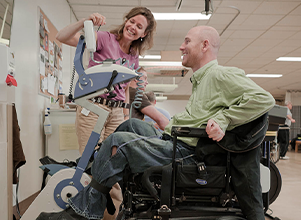Publications
Praxis is strongly committed to sharing details of the great work that is taking place throughout the SCI field. Explore SCI-related scientific papers, reports and more.

This is the breadcrumbs block. Breadcrumb will populate on actual page.
Chester Ho, Kayla Atchison, Vanessa K. Noonan, Nicole McKenzie, Lauren Cadel, Heather Ganshorn, Joanna Marie B. Rivera, Charlene Yousefi, and Sara J.T. Guilcher.Models of Care Delivery from Rehabilitation to Community for Spinal Cord Injury: A Scoping Review.Journal of Neurotrauma.Mar 2021.677-697.
DOI: doi.org/10.1089/neu.2020.7396
Spinal cord injury (SCI) is a chronic condition that results in high healthcare utilization and lifetime cost across the care continuum. In the absence of a standardized model of care delivery for SCI in western countries such as Canada, a scoping review of the literature was performed to identify and summarize existing international SCI models of care delivery. Four databases were searched using key words and subject headings for concepts such as: “spinal cord injury,” “delivery of healthcare,” “model of care,” “patient care planning,” and “care pathway.” Title, abstract, and full text review were competed by two independent reviewers. A combined total of 46 peer-reviewed and gray literature articles were included. No single SCI model of care has been adopted across different countries internationally. However, optimal attributes of models of care were identified, including the importance of having multidisciplinary SCI specialty care providers along the continuum, provision of rural SCI services and outreach, integration of primary care, peer mentoring, and using a hub and spokes model of care. These findings inform the future development of an SCI model of care, which ideally would serve all geographical locations and span the continuum of care, improving the health status and quality of life of persons with SCI.
Research Question and Objectives
The research question was: What models of service delivery, specific to the rehabilitation and lifelong care of persons with SCI exist internationally? The objective of the scoping review was to describe the types of services and identify how services are delivered to persons with SCI during the rehabilitation and community phases of care around the world.
Methods
A scoping review was selected to inform a broad research question to provide a comprehensive overview of the existing literature on a given topic. It has the advantage over a systematic review to best map the literature that exists on a topic of which not a lot is known. Our process was guided by Arksey and O’Malley’s framework for conducting scoping reviews.
The six stages of the framework adhered to were:
1) identify a research question;
2) identify studies relevant to the research question;
3) select relevant studies;
4) extract data from selected studies;
5) combine, summarize, and report the results of the review; and
6) consult with stakeholders.
Conclusions
This scoping review identified several international healthcare systems with clearly defined models of care specific to the rehabilitation and lifelong care of persons with SCI for a high-income country such as Canada. Despite the lack of international uniformity in the SCI model of care, positive attributes from the various models have been identified. By understanding these attributes, we are better equipped to identify gaps and opportunities for SCI service delivery across the SCI continuum, hence improving care to persons with SCI.
Continue to the article.
Praxis is strongly committed to sharing details of the great work that is taking place throughout the SCI field. Explore SCI-related scientific papers, reports and more.
